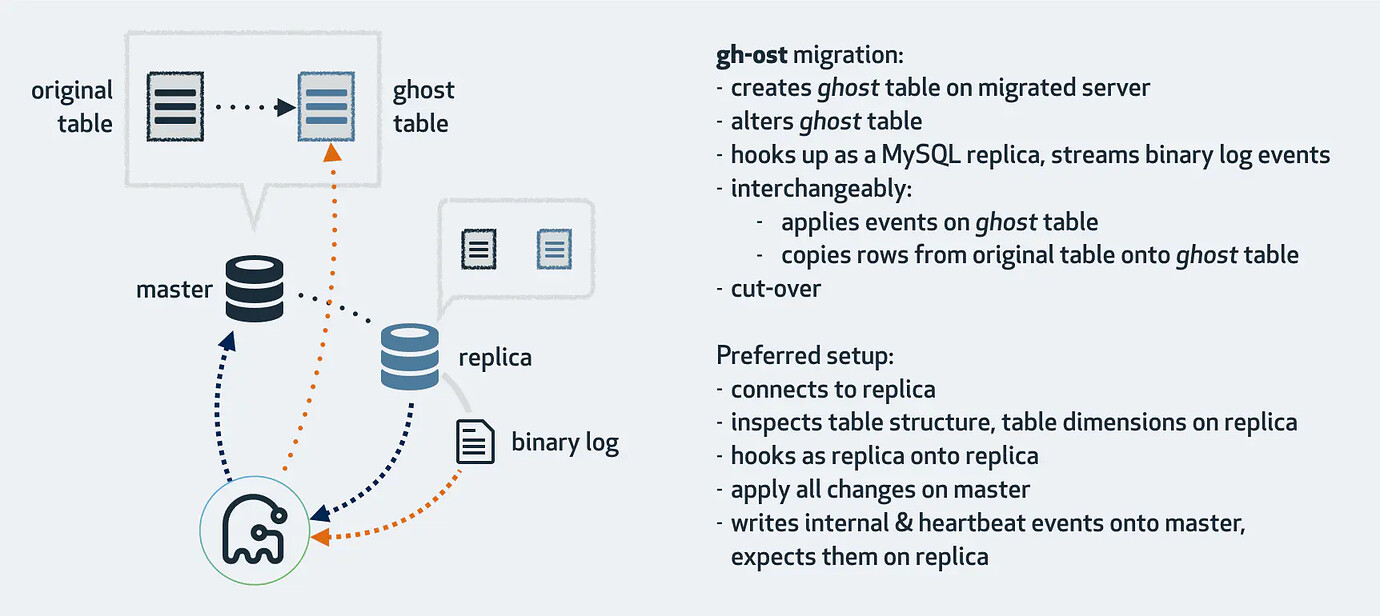转载好友文章:
作者:LittleMagic
链接:https://www.jianshu.com/p/bb7dbebbc552
Online DDL即无锁表结构变更,能够避免对表(尤其是大表)进行更改时,长时间阻塞DML操作。我们当前采用TiDB的DM组件实现上游许多业务库的合库合表与数据汇聚,DM原生支持的Online DDL工具有pt-osc(Percona开源)与gh-ost(GitHub开源)两种。但是,我们的业务库绝大多数都是阿里云RDS MySQL,采用其DMS工具做无锁变更。这导致我们每次都需要手动执行DDL语句,再指定位点恢复DM任务,操作起来比较繁琐,所以还是自己动手丰衣足食比较好。
gh-ost/DMS Online DDL Procedure
通过观察DMS Online DDL产生的binlog,可以发现它的风格与gh-ost相同。简单复习一下gh-ost的处理流程:
- 在目标库上创建影子表(ghost table,后缀为
_gho),它的结构与被变更的原表完全相同; - 创建日志表(log table,后缀为
_ghc)用于记录整个DDL执行过程中的状态; - 在影子表上执行DDL语句;
- gh-ost将自身伪装成MySQL slave,创建binlog streamer,将原表的全量数据和增量binlog迁移到影子表(两个操作同时进行);
- 迁移完毕后,将原表锁表,并重命名加上
_del后缀,再将影子表重命名去掉_gho后缀,完成cut-over。两个重命名操作是原子性执行的; - 删除
_ghc和_del表,并关闭binlog streamer。
原子性cut-over的思想十分巧妙,基于MySQL内部锁表之后,执行RENAME操作的优先级比任何DML都要高这一简单的原理。具体的分析可参见国外大佬的这篇文章。
阿里云DMS的执行流程与上述一样,只是表的命名有所变化而已:
- 影子表:
tp_[id]_ogt_[table] - 日志表:
tp_[id]_ogl_[table] - 删除表:
tp_[id]_del_[table]
下面直接上代码。
Hacking to the Code
DM将Online DDL过程中的表分为3类,代码文件online_ddl.go中的定义是:
type TableType string
const (
realTable TableType = "real table"
ghostTable TableType = "ghost table"
trashTable TableType = "trash table" // means we should ignore these tables
)
- real table:原始表;
- ghost table:影子表;
- trash table:日志表与删除表。
另外还会通过OnlineDDLStorage结构体来维护执行过程中的必要信息,如数据库连接、schema/table名称、DDL语句等。
type OnlineDDLStorage struct {
sync.RWMutex
cfg *config.SubTaskConfig
db *conn.BaseDB
dbConn *DBConn
schema string // schema name, set through task config
tableName string // table name with schema, now it's task name
id string // the source ID of the upstream MySQL/MariaDB replica.
// map ghost schema => [ghost table => ghost ddl info, ...]
ddls map[string]map[string]*GhostDDLInfo
logCtx *tcontext.Context
}
DM内部的Online DDL模块是插件化的,只需实现OnlinePlugin接口即可。该接口的定义如下,注释写得比较清楚,笔者就不多废话了。
// OnlinePlugin handles online ddl solutions like pt, gh-ost.
type OnlinePlugin interface {
// Apply does:
// * detect online ddl
// * record changes
// * apply online ddl on real table
// returns sqls, replaced/self schema, replaced/self table, error
Apply(tctx *tcontext.Context, tables []*filter.Table, statement string, stmt ast.StmtNode) ([]string, string, string, error)
// Finish would delete online ddl from memory and storage
Finish(tctx *tcontext.Context, schema, table string) error
// TableType returns ghhost/real table
TableType(table string) TableType
// RealName returns real table name that removed ghost suffix and handled by table router
RealName(schema, table string) (string, string)
// ResetConn reset db connection
ResetConn(tctx *tcontext.Context) error
// Clear clears all online information
// TODO: not used now, check if we could remove it later
Clear(tctx *tcontext.Context) error
// Close closes online ddl plugin
Close()
}
我们需要重点实现的方法是Apply()、TableType()和RealName()。后两者的逻辑比较简单,代码如下。
func (r *AliRDS) TableType(table string) TableType {
if len(table) > 8 && strings.HasPrefix(table, "tp_") {
if strings.Contains(table, "_ogt_") {
return ghostTable
}
if strings.Contains(table, "_ogl_") || strings.Contains(table, "_del_") {
return trashTable
}
}
return realTable
}
func (r *AliRDS) RealName(schema, table string) (string, string) {
tp := r.TableType(table)
idx := -1
if tp == ghostTable {
idx = strings.Index(table, "_ogt_")
} else if tp == trashTable {
idx = strings.Index(table, "_ogl_")
if idx == -1 {
idx = strings.Index(table, "_del_")
}
}
if idx > 0 {
table = table[idx+5:]
}
return schema, table
}
接下来思考如何将DMS的步骤转化成TiDB的处理方式:
- 只执行原表上的DML操作;
- 不创建日志表;
- 不创建影子表,但是将要执行的DDL记录到DM元数据库(默认为
dm_meta)以及DM-Worker的内存里; - 在cut-over阶段,将上述记录的DDL的影子表名替换成原表名,直接执行替换后的DDL。
然后就可以顺理成章地写出Apply()方法了。
func (r *AliRDS) Apply(tctx *tcontext.Context, tables []*filter.Table, statement string, stmt ast.StmtNode) ([]string, string, string, error) {
if len(tables) < 1 {
return nil, "", "", terror.ErrSyncerUnitAliRDSApplyEmptyTable.Generate()
}
schema, table := tables[0].Schema, tables[0].Name
targetSchema, targetTable := r.RealName(schema, table)
tp := r.TableType(table)
switch tp {
case realTable:
switch stmt.(type) {
case *ast.RenameTableStmt:
if len(tables) != parserpkg.SingleRenameTableNameNum {
return nil, "", "", terror.ErrSyncerUnitAliRDSRenameTableNotValid.Generate()
}
tp1 := r.TableType(tables[1].Name)
if tp1 == trashTable {
return nil, "", "", nil
} else if tp1 == ghostTable {
return nil, "", "", terror.ErrSyncerUnitAliRDSRenameToGhostTable.Generate(statement)
}
}
return []string{statement}, schema, table, nil
case trashTable:
switch stmt.(type) {
case *ast.RenameTableStmt:
if len(tables) != parserpkg.SingleRenameTableNameNum {
return nil, "", "", terror.ErrSyncerUnitAliRDSRenameTableNotValid.Generate()
}
tp1 := r.TableType(tables[1].Name)
if tp1 == ghostTable {
return nil, "", "", terror.ErrSyncerUnitAliRDSRenameGhostTblToOther.Generate(statement)
}
}
case ghostTable:
switch stmt.(type) {
case *ast.CreateTableStmt:
err := r.storage.Delete(tctx, schema, table)
if err != nil {
return nil, "", "", err
}
case *ast.DropTableStmt:
err := r.storage.Delete(tctx, schema, table)
if err != nil {
return nil, "", "", err
}
case *ast.RenameTableStmt:
if len(tables) != parserpkg.SingleRenameTableNameNum {
return nil, "", "", terror.ErrSyncerUnitAliRDSRenameTableNotValid.Generate()
}
tp1 := r.TableType(tables[1].Name)
if tp1 == realTable {
rdsInfo := r.storage.Get(schema, table)
if rdsInfo != nil {
return rdsInfo.DDLs, tables[1].Schema, tables[1].Name, nil
}
return nil, "", "", terror.ErrSyncerUnitAliRDSOnlineDDLOnGhostTbl.Generate(schema, table)
} else if tp1 == ghostTable {
return nil, "", "", terror.ErrSyncerUnitAliRDSRenameGhostTblToOther.Generate(statement)
}
err := r.storage.Delete(tctx, schema, table)
if err != nil {
return nil, "", "", err
}
}
default:
err := r.storage.Save(tctx, schema, table, targetSchema, targetTable, statement)
if err != nil {
return nil, "", "", err
}
}
return nil, schema, table, nil
}
最后不要忘了添加Online DDL配置项的定义,以及相关的错误信息等边角代码,不一一列举了。
var OnlineDDLSchemes = map[string]func(*tcontext.Context, *config.SubTaskConfig) (OnlinePlugin, error){
config.PT: NewPT,
config.GHOST: NewGhost,
config.ALIRDS: NewAliRDS,
}
const (
GHOST = "gh-ost"
PT = "pt"
ALIRDS = "ali-rds"
)
重新编译dm-master与dm-worker二进制文件,并替换掉原本通过TiUP部署的文件(具体路径因人而异)。
CGO_ENABLED=0 GOOS=linux GOARCH=amd64 make dm-master
CGO_ENABLED=0 GOOS=linux GOARCH=amd64 make dm-worker
在DM作业的配置文件中指定 online-ddl-scheme 参数。
online-ddl-scheme: "ali-rds"
使用DMS工具做无锁表变更操作,可以发现能够正常同步了。
The End
继续搬砖去了。
Enjoy~
